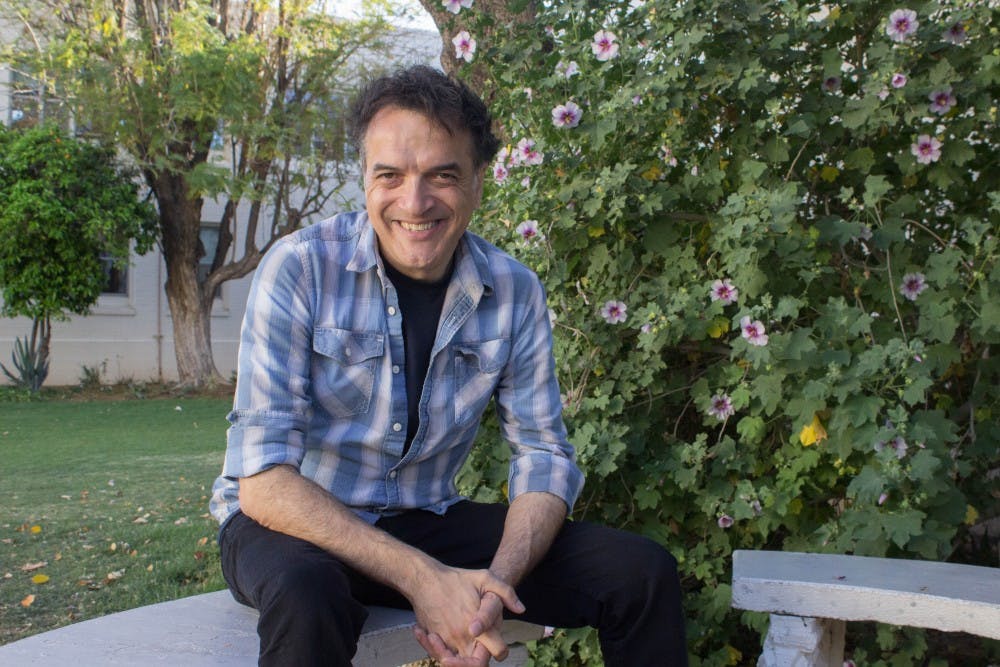Change is happening in the School of Film, Dance and Theatre, and Lance Gharavi is at the helm.
An associate professor and the assistant director of theater at ASU, Gharavi was awarded the Ally of the Year Award by the Bridge Initiative: Women in Theatre, which promotes gender equity in the dramatic arts. Gharavi leads efforts at ASU to include more diversity in ASU MainStage productions and the whole theater program.
Known for his experimental methods of teaching, he is especially pushing the boundaries of theater norms by being more inclusive of the voices and roles of women.
"It seemed pretty obvious," Gharavi said. "Why would we put on shows only by men?"
Gharavi said he works with an entire team of faculty and students to curate the shows that the theater program puts on, and as the artistic director of the school he was able to articulate that vision to his team.
"I felt like this was an honor for the entire school of Film, Dance and Theatre and the Herberger Institute for the Design and the Arts because of our focus on diverse voices, diverse stories and our mission from the school," Gharavi said.
Gharavi said he was inspired to put on the predominately female seasons after seeing how women and other minority groups were being underrepresented in the arts. He realized that the only way that the underrepresentation was going to change was if the institutions producing these work change their own behavior.
"Things are the way they are because of institutions and because of systems," Gharavi said. "When you start to gain access of the levers of institutions, it's an opportunity to make a better future working with other people."
Gharavi said that above all, the vision of the school is to put on shows and create works that the youth of today would want to see and continuing that vision into the future.
"What I'm interested in doing with the theater here is not giving young people a voice, because they clearly already have one, but getting out of their way and supporting their visions and their efforts in building the future and art that they want, and that there is a vision for justice there," Gharavi said.
One of the experimental shows that Gharavi selected last season was the Gammage MainStage show "Men on Boats" by Jaclyn Backhaus which featured an all-female cast, despite the characters in the story all being male.
Tracy Liz Miller, the director of the theater department at Chandler-Gilbert Community College and co-producing artistic director and one of the founders of the Bridge Initiative, came to ASU as the guest director of the production.
Miller said The Bridge Initiative was formed in 2015 in response to the lack of gender parity in all aspects of theater locally, nationally and internationally.
She said Gharavi was presented with the award because of his extensive work with the Bridge Initiative and for playing a pivotal role by choosing to have a season of plays all penned by women, something he claimed the organization largely influenced.
"So not only did he acknowledge the need for 50/50 parity, he raised the bar and offered a 100 percent female playwright season," Miller said. "Right then, we knew we had a strong ally and our conversations with Lance intensified as we discussed the need for our stages to reflect not only a balance in gender, but also a diversity that reflected our modern world."
Miller said this was when Gharavi hired her to direct "Men on Boats," and that collaboration gave the organization the opportunity to educate their audiences in a multi-pronged approach that The Bridge Initiative and ASU's Herberger Institute embraced fully.
"Lance continues to choose incredibly diverse and inclusive plays for the ASU theatre students and faculty to produce, instilling at the the undergrad and graduate level that these practices are necessary and vital to a healthy artistic output and audience relationship," Miller said.
Molly Bishop, a theater and communications major who was a cast member in "Men on Boats," said Gharavi is deserving of the award for his efforts to make the theater program at ASU more inclusive towards a wider demographic.
"I think he's made good progress on his goal of inclusion in the program, as we've had shows that spotlight non-male performers, performers of color and performers who defy standard types or stereotypes for characters," Bishop said.
Bishop said in a world where it is easy to misuse power or not take action at all, it is important to recognize those who use their position of power to uplift the voices of those who may not have the same ability.
"Being a good ally means understanding your own societal power and the power imbalances that exist, then utilizing that position as a platform for positive change," Bishop said.
She said going forward, theater at ASU can continue giving a voice to women by not only featuring works written by women, but also highlighting women directors and designers.
"We can grow by focusing on intersectionality and finding ways we can continue to educate ourselves as an entire program on the intricacies of inclusivity," Bishop said. "The more inclusive we can be overall, the more voices we can project into the community."
Reach the reporter at pthaung@asu.edu or follow @seaboiii on Twitter.
Like The State Press on Facebook and follow @statepress on Twitter.




